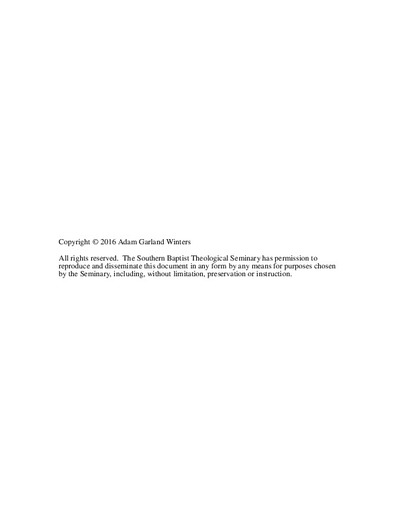T. T. Eaton and the Politicization of Baptist Ecclesiology
Subject
Eaton, T. T. (Thomas Treadwell), 1845-1907Southern Baptist Convention--Clergy--Biography
Southern Baptist Convention--History--19th century
Abstract
Chapter 1 is the introduction, which proposes that Thomas Treadwell Eaton achieved great influence in the Southern Baptist Convention and utilized that influence to effect political change in the relationship between Southern Baptist churches and the denomination.
Chapter 2 traces the influences of Eaton’s formative years among Tennessee Baptists. Eaton became an avid supporter of denomination institutions for higher education and was an active participant in state convention meetings, where he led the Baptists in the state to unify for the purpose of supporting a university.
Chapter 3 follows Eaton to Virginia where he pastored between 1875 and 1881, and became intimately familiar with the political influence of denominational newspapers. As a pastor and leader in denominational causes, he was immensely successful in raising associational support for foreign missions and religious education.
Chapter 4 surveys Eaton’s first decade as a Baptist pastor in Louisville. Particular emphasis is given to his growing denominational leadership in the Long Run Baptist Association and his contributions to the surge of denominational giving towards missionary causes and Southern Baptist ministries.
Chapter 5 demonstrates how Eaton worked to promote his vision for Baptist identity through literature dissemination and denominational leadership. Eaton used the advantage of the denominational press to promote the distinctive doctrines of Baptists and to oppose heterodox theology. Most importantly, Eaton became a leading proponent in the development of the Southern Baptist Convention’s denominational consciousness through his support of the Sunday School Board and the 1894 Fortress Monroe Comity.
Chapter 6 introduces the Whitsitt controversy and demonstrates Eaton’s efforts to oppose Whitsitt for undermining Baptist identity. Emphasis is given to the Western Recorder editorial strategies, the publishing output of the Baptist Book Concern, and the denominational parliamentary meetings that collectively pressured Whitsitt to resign from the seminary presidency.
Chapter 7 examines Eaton’s career after the Whitsitt controversy; though perceived by many as a divisive force, he continued to defend Baptist principles against the creeping influence of liberal theology and kept pressure upon the Southern Seminary faculty to respect denominational interests. Eaton remained actively involved in denominational causes. Chapter 8 is the conclusion.

